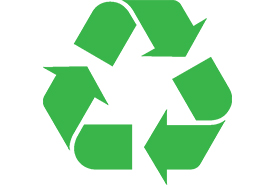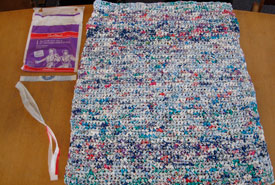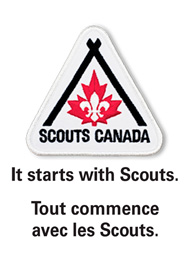Heard it from a Scout: 15 things you may not know you can recycle

International recycling logo (Photo by Krdan, Wikimedia Commons)
Now more than ever, it’s important that we reduce our ecological footprint to create a greener world for the future. Scouts Canada has always encouraged members to do their part to create a cleaner environment, whether it be through litter cleanups or leave-no-trace initiatives that encourage people to leave the surrounding environment the way they found it. Recycling is one of the easiest ways to be green, and there are so many things you can recycle!
Here are 15 things that you might not know you can recycle:
1. E-waste
Did you know that you can recycle electronics — also known as e-waste? Every day, people update their old electronics to the latest technology. Proper disposal of electronics is extremely important, as toxins can leak into and contaminate the land and water. Electronics, such as old laptops and TVs, can be recycled for spare parts and the metal used again, such as at a private company or your city’s local one. Batteries can also be recycled at certain facilities.
2. Crayons
Crazy Crayons accepts old and broken crayons; they melt down the wax to create new crayons for schools and kids across Canada. Alternatively, you can donate crayons to local shelters or youth programs for other children to use.
3. Cords and wires
Many people have old cords and wires lying around the house, many of which they don’t remember what they are even used for. Cords and wires can be kept out of landfills and recycled, where they are stripped for their different metals and repurposed.
4. Inkjet cartridges
Next time you run out of ink in your printer, think twice before throwing away the empty cartridge. Inkjet cartridges can be refilled for further use and to reduce waste. Many stores, including some Staples locations, have ink recycling programs, which allow you to drop off old cartridges for reuse.

Mat made from recycled milk bags (Photo from MILKBAGSunlimited)
5. Milk bags
Many common household objects can be recycled, including milk bags. Charities such as MILKBAGSunlimited, based out of Toronto, will weave milk bags into mats, mattresses, table covers for surgery use and even slippers. Alternatively, many municipalities also recycle them. Milk bags don’t disintegrate, so it’s important to never throw them in the trash.
6. Pop can tabs
Pop can tabs can be recycled, but not in the way you may think. Although many people recycle the pop can tabs along with the cans, those tabs can also be donated to different charities for fundraising. The Robert Hampson Tabs for Kids Fund collects pop can tabs, recycles them and then uses the money earned to buy wheelchairs for children. This means that when you recycle, you’re also helping others while helping the planet.
7. Clothing and textiles
Old clothing, blankets and towels can be recycled, even if they are too torn to donate to charity. Textiles can be made into rags, or broken down and made into something new. Several municipalities across Canada run textile recycling programs with the aim of keeping all fabrics out of landfills. In 2013, H&M stores launched a worldwide garment collecting initiative. H&M stores accept donations of clothing and textiles in all of their stores across Canada and beyond.
8. Old shoes
When you buy a new pair of shoes, the old ones might take up room in the back of your closet or the landfill, never to be used again. Running Free recycles running shoes and Crocs' SolesUnited campaign accepts used Crocs. Both organizations donate wearable footwear to individuals in need.
9. Motor oil
“Empty” motor oil containers often still contain trace amounts of oil in them; enough, in fact, that if you left 25 one-litre empty bottles upside down overnight, you would have a full one-litre bottle in the morning. If you throw out these containers, it could release the oil into the environment. Check with your local toxic waste recycling facility, Canada Fuels Association’s used oil programs or with a local mechanic shop that may take in old bottles, filters and oil, which can be re-refined and reused.
10. Paint
Similar to motor oil, paint is considered hazardous waste and needs to be disposed of properly in order to protect the environment. If you don’t need leftover paint, donate it to Habitat for Humanity.
11. Cereal and Ziploc bags
Some companies — including Trex and TerraCycle Canada — can help you recycle your cereal bags and Ziploc bags by turning them into other products, such as playground equipment and garbage cans.
12. Corks
Wine bottle corks can be recycled at companies across Canada. In 2008, Whole Foods launched its Cork ReHarvest program in North America, helping to reduce the amount of corks that end up in landfills each year.
13. Mattresses
Throwing mattresses into the landfill creates a large amount of waste. Sleep Country will take old mattresses for a small fee and donate them to families in need.
14. Bicycles
You can recycle bicycles that you have outgrown by donating them to companies that repair them and give them to people in need. There are multiple companies doing this in Canada, such as Bikes Without Borders.
15. Glasses
Old eyeglasses can be recycled and given to someone in need. The Canadian Lions Eyeglass Recycling program has multiple locations across Canada where you can donate your old glasses to someone in need.
Recycling is one of the best ways to help the environment, and there are many everyday objects that can be reused, reduced or recycled. Always check your municipal website to confirm what can and can’t be recycled, as different regions have different waste management policies.
Recycling doesn’t just mean putting it in the right bin; there are many ways to reduce the amount of waste you produce and find new life for items you no longer need. It’s important to take personal responsibility when it comes to our carbon footprint, and recycling is a great place to start.
"Heard it from a Scout" is written by members of Scouts Canada’s Youth Spokesperson program. This post was authored by Stephanie Aultman.


